Long Live The King!
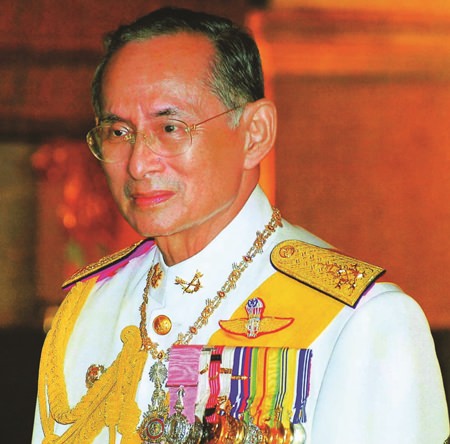
This year marks the 87th Royal Anniversary of the Birth of His Majesty King
Bhumibol Adulyadej the Great, the longest reigning monarch in the world today.
Pattaya Mail Media Group, which includes Pattaya Mail, Pattaya Blatt, Pattaya
Mail Television and Chiang Mai Mail, would like to join the Kingdom of Thailand
in humbly extending our loyal greetings and best wishes to His Majesty the King
in celebration of the auspicious occasion of His Royal Birthday on December 5,
the date which also marks Father’s Day in Thailand.
Long Live His Majesty the King and Happy Fathers Day to all. (Photo courtesy
Bureau of the Royal Household)
By Peter Cummins,
Photos: Courtesy of the Bureau of the
Royal Household
The Pattaya Mail Media
Group joins the entire Kingdom in humbly extending our best wishes of loyalty
and devotion to His Majesty King Bhumibol Adulyadej the Great, the World’s
Longest-Reigning Monarch on the auspicious occasion of His 87th Birthday,
December 5, 2014.
We present here, on these
pages, sometimes repeated, oft quoted excerpts of the incredible life of our
most gracious Father of the Thai Kingdom, written by our special correspondent
Peter Cummins.
Prologue
It is very difficult to
encapsulate the incredible achievements of our beloved King in this short
article. The writer, rather, has highlighted just some of the events, honours
and accolades which have been dedicated to His Majesty over the long years of
his reign, culminating in this auspicious year of his 87th birthday.
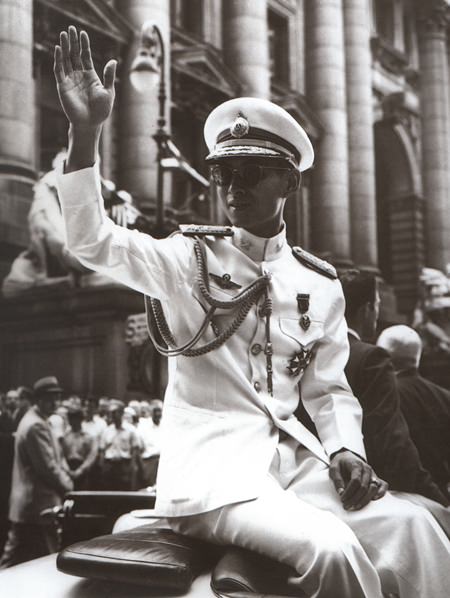
Born on Monday, the fifth
of December 1927, at Mount Auburn Hospital in Cambridge, Massachusetts, HM King
Bhumibol Adulyadej the Great reaches his eighty-seventh birthday, also
celebrating sixty-eight years on the Thai Throne.
In his Coronation Oath,
promulgated on the fifth of May 1950, the newly-crowned Rama the Ninth vowed
that, “We will reign with righteousness for the benefit and happiness of the
Siamese people,” and, in the almost seven decades which have passed since that
auspicious day, the concept of “righteousness” has dominated his reign. In fact,
HM the King has constantly revered the age-old Buddhist concept of ‘Kingship’ as
defined in the Sutta Pitaka of the Tripitaka in which a King is
defined as Mahasammata - a King of Righteousness.
Our King has steadfastly
reigned by these principles, embodying good kingship in his own life and example
and often speaking out against the affliction of the evils so clearly spelled
out in the Buddhist philosophy.
There will inevitably be
some familiar material in parts of this story, for HM the King’s development
projects have been ongoing for more than 50 years and there is, of course, a
historical perspective which has been incorporated.
As His Majesty reaches his
eighty-seventh birthday this day, 5 December 2014, the Thai Nation celebrates
again, in a thousand different ways, with every person from the youngest to the
oldest renewing the pledge of loyalty and devotion to the beloved King who,
during this year also celebrated his sixty-fourth year of marriage to HM Queen
Sirikit.
Musical Tributes
There have been so many
tributes to HM the King from all corners of the world over the past couple
years, that here it is only possible to outline some of them.
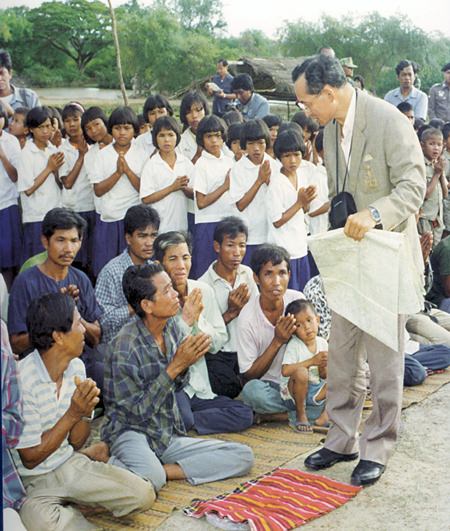
One of the most pervasive
has been in the form of Musical Tributes, not surprisingly, as His Majesty is an
acknowledged composer of classical music and an exceptionally-talented jazz
aficionado.
An Austrian ensemble who,
despite never having worked together, recently succeeded in producing an album -
the Royal Lullaby - that is faithful to the integrity and authenticity of the
original pieces, and in the process created a musical repertoire of
international calibre.
“It all started one
December when we all met for the first time. I played for Her Majesty the Queen
and was asked to include His Majesty’s Love In Spring in the programme. I
didn’t know the music or what to expect so was very curious and I came here and
just fell in love with the music,” said Austrian solo violinist Wolfgang David,
one of the musicians who performed for the album.
The Royal Lullaby
album also showcases the talents of the Royal Philharmonic Orchestra, Swiss
Conductor Emmanuel Siffert and local pianist Indhuon Srikaranonda. Revered Thai
National Artist Prof Manrat Srikaranonda was also involved in the musical
production.
Commissioned by Her Royal
Highness Princess Galyani Vadhana, the album highlights 10 compositions that
reveal HM the King’s musical ingenuity, including the well-known Lullaby
and Summertime.
On HM the King’s
compositions, David said, “The music is uplifting, which makes it very human.
That’s why I love to play it because I also believe that music should lift
people’s minds - it’s not just about having a good time for an hour in a
concert.”
Craker acknowledged that
while His Majesty the King is already a respected figure in the international
community, these newly-arranged pieces will further enable Western audiences to
enjoy the music.
Craker also noted that the
album’s juxtaposition of classical and jazz compositions was quite unusual.
“There are elements of Thai folk music in the melodies, but I think His Majesty
is greatly knowledgeable on Western music and he has been able to embody all
those styles and influences with his own concepts,” he added.
As an interpreter of the
melodies, Chris Craker understood the responsibility that he had in
communicating HM the King’s music to an international audience.
Another tribute to HM the
King’s musical talents came from the Nagoya Philharmonic Orchestra which, during
the annual Toyota Classics concert featured the internationally-acclaimed Nagoya
Philharmonic Orchestra, under the baton of Tatsuya Shimono, showcasing two of
HM’s musical masterpieces in its programme; namely Kwam Fun Un Soong Sood
(A Dream Most Noble) and Paendin Kong Rau (Our Land).
HM the King is also
well-known as a songwriter who has more than 40 published songs to his credit.
Kwarm Fun Un Soong Sood, a symphonically-conceived piece, was written in
1971 and has since become one of HM’s most popular and loved compositions.
Yet another musical
evening was held by the Bangkok Symphony Orchestra to celebrate His Majesty’s 69th birthday
in 1996. The Orchestra performed a special concert under the baton of Hikotaro
Yazaki, featuring soloist Pornphan Banternghansa on the piano, at the Thailand
Cultural Centre.
The programme comprised
Fanfare and Rhapsody for a Royal Celebration, a specially-composed piece for
the celebration by UK composer Simon Wallace, which was followed by Rhapsody on
a Theme of Paganini, Opus 43 for Solo Piano, by Rachmaninoff, and concluded with
Symphony No. 4 by Brahms.
An evening of HM the
King’s music was led by Sasin Alumni Associations in a concert entitled “The
Royal Composition of His Life Journey: The King and His Music” to celebrate the
60th anniversary
of His Majesty the King’s accession to the throne.
During the presentation,
the Bangkok Symphony Orchestra performed His Majesty’s compositions as arranged
in an orchestral style by Rear Admiral ML Usni Pramoj, who was also the
conductor.
HM the King - the
World’s Longest Reigning Monarch
It was eight years ago, in
2006, on the occasion of the 60th anniversary
of his accession to the Thai Throne, Their Majesties the King and Queen presided
over splendid festivities as representatives of 25 royal houses from Europe,
Africa, the Middle East and Asia had come to Bangkok to honour His Majesty King
Bhumibol Adulyadej the Great.

The royal guests came from
near and far to enjoy Thai hospitality and the friendship of the Thai Royal
Family.
But - and, perhaps, more
significantly - to honour this celebration, millions of people packed the areas
around Bangkok’s Royal Plaza to hear HM the King deliver a rare public address
in which he called for national unity.
“The responsibility to
preserve the nation,” His Majesty reminded his subjects, “does not belong to any
particular person but to all Thais who must do their utmost to develop the
country and make it prosperous, stable and peaceful,” he said. “Therefore, I, as
a Thai, have the same responsibility as all Thais do.”
In November 2006, Time
Magazine honoured the King an ‘Asian Hero’ among 65 prominent figures so
designated.
“The King’s stewardship
has been so masterful that in times of crisis, Thais invariably turn to one man:
(HM) King Bhumibol,” writes the article published in the magazine’s Nov 13, 2006
issue. “On two occasions - October 1973 and May 1992,” Time editorialized
- “with Thailand descending into chaos, (HM) the King, armed only with his moral
authority, intervened to end bloodshed.”
Elsewhere, His Majesty had
been named the first recipient of the Norman E Borlaug World Food Prize
Medallion in recognition of His Majesty’s outstanding humanitarian service in
alleviating starvation and poverty, presented by the World Food Prize Foundation
on July 23, 2007.
The medallion is named in
honour of the World Food Prize founder and Nobel Peace Prize Laureate Dr Norman
Borlaug.
“Since his accession to
the throne in 1946, HM King Bhumibol Adulyadej has displayed a deep concern that
the Thai people have sufficient food and proper nutrition,” said Ambassador
Kenneth M Quinn, president of the World Food Prize Foundation.
The royal projects have
benefited millions of people across Thailand, with a particular focus on aiding
ethnic groups and hill tribes in mountainous regions.
“Dr Borlaug tells of his
visits to Thailand and the time he spent meeting with His Majesty and walking
through the countryside with him as they discussed possible new approaches to
agriculture,” said Mr Quinn.
HM the King was also
lauded by Kofi Anan, then Secretary-General of the United Nations, as the
“Development King”, acknowledging his dedication to promote child health, combat
iodine deficiency and increase access to education.
At the same time, the
United Nations Development Programme presented His Majesty the UNDP Human
Development Lifetime Achievement Award “in recognition of the global relevance
of his call for a sufficiency approach to development” (May, 2006).
More recently, the
Budapest-based International Federation of Inventors’ Association (IFIA)
presented the IFIA Cup 2007 for His Majesty’s Chai Pattana wheel used to treat
water. The IFIA also presented its Genius Medal prize to honour His Majesty’s
Self-Sufficiency Philosophy, and his New Theory, which revives farming
techniques, based on Thai wisdom focusing on minimal use of resources but aiming
for higher agricultural productivity.
Development for
the People
HM the King established
several Royal Development Study Centres - or, as they are better known - “Living
Museums” - situated in the roughest terrain in their respective regions. These
centres are the locale for experiments in reforestation, irrigation, land
development and farm technology which are conducted to find practical
applications within the constraints of local conditions, geography and
topography. His Majesty’s aim is to restore the natural balance, to enable
people to become self-supporting.

The first centre organized
was that of Khao Hin Son, in the rocky area of Chachoengsao’s Phanom Sarakam
District. Here, the centre studies how to turn the barren soil, caused by
deforestation, back into fertile land again.
Other centres are located
at strategic places around the Kingdom.
The Pikul Thong Centre at
Narathiwat studies the swampy, acidic land of the southern-most region. The Phu
Phan Centre in Sakon Nakhon studies soil salinity and irrigation in the
country’s biggest region, the Northeast, which suffers from endemic drought. The
Krung Kraben Bay Centre in Chantaburi examines the rehabilitation of mangrove
forests and coastal areas following massive destruction. The Huay Sai Centre in
Petchaburi studies the rehabilitation of degraded forests and shows villagers,
in their turn, how to protect the forests.
When he was in doubt, HM
the King would fly over a particular area, armed with aerial photographs and
maps of the terrain, noting features as they passed underneath. And, being an
excellent photographer himself, he also took His own pictures, later to
juxtapose them on area charts to obtain a complete and detailed image of the
specifics which helped his planning of various development projects.
His Majesty’s insightful
approach to local prevailing conditions has enabled him to improvise new
theories for agricultural development, to provide guidelines for educating
farmers on self-sufficiency, and to solve problems of goitre by feeding iodine
into salt roads at strategic points.
In all these works, His
Majesty has promoted a simple approach using environmentally friendly techniques
and utilizing moderate amounts of locally available resources. For example,
before environmentalism became a major force in the development equation, His
Majesty was using vetiver grass to prevent erosion, controlling ground water
level to reduce soil acidity, and seeding clouds with simple materials such as
dry ice, to produce rain.
A ‘Simple’ approach
HM the King’s philosophy
to development problems has been to “keep it simple” - relying on an intimate
knowledge of Nature and her immutable law, such as using fresh water to flush
out polluted water or dilute it through utilization of normal tidal
fluctuations. The ubiquitous water hyacinth too can be ‘harnessed’ to absorb
pollutants.
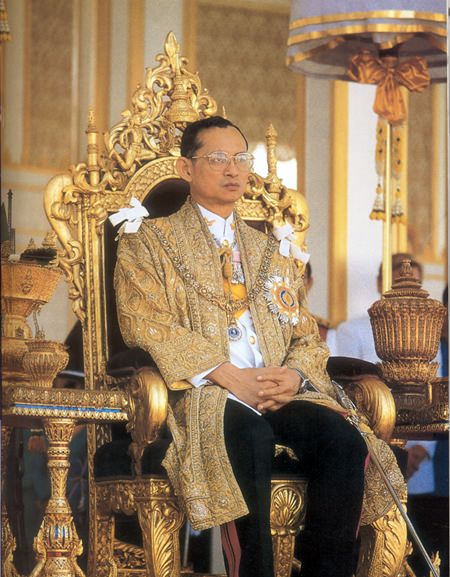
The results of any
development, HM the King asserts, must reach the people directly as a means of
overcoming immediate problems, translating into “enough to live, enough to eat”,
while looking at a longer-term result of “living well and eating well.”
His Majesty compares this
to using adharma (evil) to fight evil, observing that both pollution and
the water weed are a menace, but they can be used to counteract each other, thus
lessening the damage to the environment.
HM the King himself
practices this ‘simple approach’ and brings a down-to-earth approach to which
the people can readily relate. He studies and deliberates exhaustively on the
particular project and then reveals his thinking in short, easy-to-grasp titles.
The very simplicity belies the profundity of the philosophy, for each title
reflects a much deeper insight into a given problem and often, at the same time,
hints at the mode of operation to be employed.
HM the King undertook the
establishment of the Royal Development Projects in 1969, primarily as a means of
arresting the opium growing and deforestation caused by the Hilltribes’ slash
and burn agriculture and to improve their standard of living. The first was
established at a Hmong village on Doi Pui in Chiang Mai Province and now has
spread to Chiang Rai, Lamphun and Mae Hong Son. Over the years, the Projects
have been instrumental in the conversion of the poppy fields being turned into
groves of temperate fruits and vegetables.
Under the dynamic
direction of HM the King’s close colleague, HRH Prince Bhisadej Rajani, who is
the Director of the Projects, operating from his base at Chiang Mai University,
there are currently four research stations and 35 Royal Project Development
Centres which incorporate some 300 villages, comprising 14,000 households and
approximately 90,000 farmers.
The Royal Development
Projects Board, under the Office of the Prime Minister, also serves as the
secretariat for the Chai Pattana Foundation which is directly responsible for
the work related to the royal development projects. Now, more than three decades
later, the results can be seen in the new life which has come to many of the
mountain villages. Greenery has returned to once-denuded forest areas and barren
hills and the opium cultivation, a cause of extreme national concern, is
virtually a past era.

“The key to the success of
the Project lies in His Majesty’s guidelines,” explains HRH Prince Bhisadej.
“They focus on obtaining knowledge, through research, avoiding bureaucratic
entanglements and swift action to respond to the villagers’ needs, while
promoting self-reliance,” he adds. “The effectiveness of this approach has been
applauded internationally.” For example, in 1998 the Royal Project won both the
Magsaysay Award for International Understanding and the Thai Expo Award for
attaining the quality standard of Thai Goods for Export.
Epilogue
Thus, through the
illustrious decades of his rule, HM the King has been the very embodiment of his
Oath of Accession that, “We will reign with Righteousness for the Benefit and
Happiness of the Siamese People.”
The world’s
longest-reigning Monarch, this week celebrating his eighty-seventh birthday,
continues to be, as he has been for the half-century of his just reign, “The
light of his land, the pride of his people and a shining example to all peoples
of a troubled world.”
All of us at the
Pattaya Mail Publishing Company, Pattaya Mail, Pattaya Blatt, Chiang Mai Mail
and Pattaya Mail TV, join the Kingdom in wishing His Majesty a
most Happy Birthday, long life and our sincerest thanks for allowing a similar
celebration of “Fathers’ Day 2014" throughout the Kingdom.
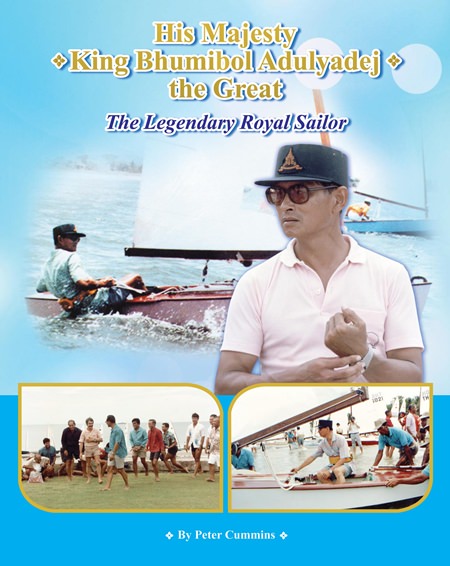
As a tribute to His Majesty, Pattaya Mail has
published a special book titled, “His Majesty King Bhumibol Adulyadej the Great,
The Legendary Royal Sailor” now available at the Pattaya Mail office.

